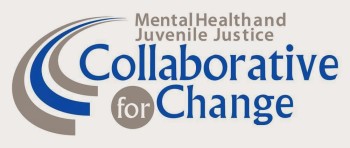Mental Health Training Initiative for State and Local Juvenile Detention and Correctional Systems

A new effort to create sustainable mental health training capacity within state and local juvenile justice systems will offer up to six sites an opportunity to be trained in the Mental Health Training Curriculumfor Juvenile Justice (MHTC-JJ). This project, which is jointly supported by the Office of Juvenile Justiceand Delinquency Prevention (OJJDP) and the John D. and Catherine T. MacArthur Foundation (MacArthur Foundation), will be conducted by the Mental Health and Juvenile Justice Collaborative forChange (Collaborative for Change) at the National Center for Mental Health and Juvenile Justice (NCMHJJ).
Background
The majority of youth in contact with the juvenile justice system experience mental health disorders, with some youth significantly impaired. Many of the staff supervising and working with youth in juvenile detention and correctional facilities have received little formal training on adolescent development and mental health to help them effectively respond to youth with mental health disorders. To address this need, the Models for Change Mental Health/Juvenile Justice Action Network created a specialized training curriculum, the Mental Health Training Curriculum for Juvenile Justice, through support from the MacArthur Foundation.
Overview of the MHTC-JJ
The MHTC-JJ is a one-day training for juvenile justice staff that focuses on adolescent development, mental health disorders and treatment, the critical role of families, and practical strategies for engaging and interacting with youth. The training is delivered in a classroom setting and includes a mix of didactic presentations, interactive exercises, videos, and small- and large-group discussion. Since its release in 2011, the NCMHJJ has successfully trained over 500 trainers on the MHTC-JJ in over 20 states and jurisdictions.
As part of this initiative, up to six new sites will be selected to receive training on the MHTC-JJ from expert training teams provided by the Collaborative for Change at the NCMHJJ. A train-the-trainer approach will be used to train trainers to ensure that they acquire mastery of the subject matter and to teach them how to present the material to ensure ongoing sustainability of this effort. Upon successful completion of the training, each site will have a cadre of “trained trainers” who can skillfully deliver the MHTC-JJ to staff throughout their system, as well as train new trainers to create an infrastructure to support ongoing training efforts.
This project is part of a broader collaboration between OJJDP and the MacArthur Foundation’s Models for Change Legacy Initiative, which includes three additional projects:
§ Reducing Racial and Ethnic Disparities and Disproportionate Minority Contact: Employing acollaborative, data-driven approach to improve equity and enhance outcomes for youth of color who come into contact with the juvenile justice system. The Center for Children’s Law and Policy (CCLP) will provide technical assistance and project oversight.
§ Dual Status Youth Technical Assistance Initiative: Designing and implementing multi-systemresponses to improve outcomes for youth involved in both the child welfare and juvenile justice systems and to help these systems work more effectively and efficiently together. Technical assistance utilizing a proven framework for system coordination and integration will be provided by the Robert F. Kennedy National Resource Center for Juvenile Justice, led by Robert F. Kennedy Children’s Action Corps.
§ Risk Assessment and Behavioral Health Screening: Using evidence-based tools for effectivecase planning and measurable reductions in out-of-home placements and risk for future delinquency. Technical assistance, research, and project oversight will be provided by the National Youth Screening and Assessment Project (NYSAP) at the University of Massachusetts Medical School (UMMS).
This solicitation for the Mental Health Training in Juvenile Justice Systems initiative seeks to train trainers within juvenile detention and correctional agencies through train-the-trainer sessions. State, regional, and local juvenile justice agencies that are responsible for overseeing and managing juvenile correctional and/or juvenile detention facilities are eligible to apply.
For Further Information
Application materials and instructions will be available on the Mental Health and Juvenile Justice Collaborative for Change website (http://cfc.ncmhjj.com) on October 3, 2014.
Questions? Please contact Ashley Degnan at 1-866-962-6455 ext. 7 or email her at This email address is being protected from spambots. You need JavaScript enabled to view it., indicating “MHTC-JJ Training Initiative” in the subject line.
About the Mental Health and Juvenile Justice Collaborative for Change
The Mental Health and Juvenile Justice Collaborative for Change is a multi-dimensional source of information, training, and technical assistance on mental health and juvenile justice that actively promotes the replication and expansion of resources developed through Models for Change and the Mental Health/Juvenile Justice Action Network initiatives. Coordinated by the National Center for Mental Health and Juvenile Justice at Policy Research Associates, the Collaborative for Change is one of four resource centers within the John D. and Catherine T. MacArthur Foundation’s Resource Center Partnership.
About the MacArthur Foundation
The MacArthur Foundation supports creative people and effective institutions committed to building a more just, verdant and peaceful world. The Foundation’s Models for Change initiative seeks to accelerate reform of juvenile justice systems across the country. Focused on efforts in select states, the initiative aims to create replicable reform models that effectively hold young people accountable for their actions, provide for their rehabilitation, protect them from harm, increase their life chances, and manage the risk they pose to themselves and to public safety. More information is available at www.modelsforchange.net.

